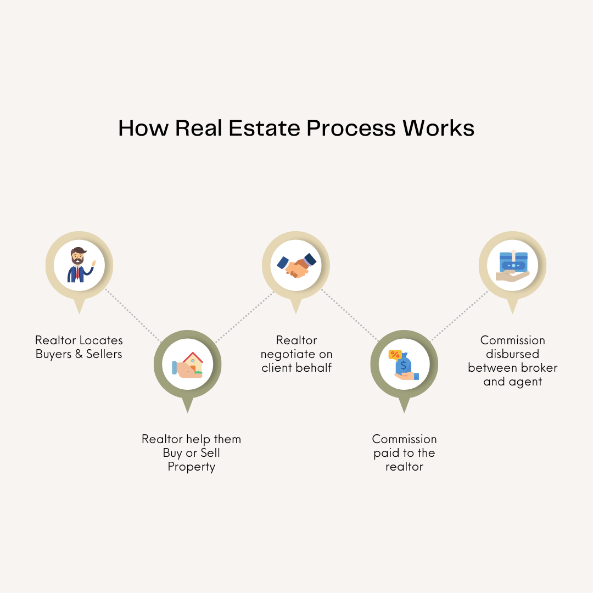Realtor Commission: What Are They and Who Pays Them?
March 19, 2022

The Complete Guide to Real Estate Commissions: Who Pays Them, How Much They Are Paid.
For many people, their home is their biggest investment. It’s important for them to understand the (ins and outs) of real estate commissions who pays them, how much they are, etc.
This blog post will serve as a comprehensive guide to real estate commissions, answering all of the most commonly asked questions.
Table of Contents
-
Who is Realtor?
-
What is the Difference Between Real Estate Agent and Realtor?
-
What is Realtor in Real Estate and How does the Process Works?
-
How to Find a Good Real Estate Agent in Houston for buying or selling
-
Who Pays the Realtor Commission?
-
What is a commission in real estate in Houston, Texas?
-
How are commissions conventionally paid?
-
Who pays the commission in real estate business?
-
How Does House Hold Rebate Standout Different in Selling?
-
What is a Dual Agency Relationship in Real Estate?
Who is Realtor?
A realtor is also represented as a real estate agent. They are professionals who represent homeowners in purchasing or selling a home. They provide guidance to buyers and sellers, negotiate the contract, and help with inspections, financing, and other details.
Real estate commissions are essential factors in determining income. The fee is the percentage of the sale price that the agent gets for selling a home.
In real estate seller’s agent charge about 4-6% of the commission from the sale price. Whereas, the commission is further shared with the buyer’s agent and the brokerage firm.
What is the Difference Between Real Estate Agent and Realtor?
The terms “real estate agent” and “realtor” are utilized interchangeably, but there is a distinction between the two titles. They are someone who is licensed to sell real estate. On the other hand, a realtor is a proxy who is also a member of the National Association of Realtors.
Membership in the National Association of Realtors provides realtors with some benefits, including access to continuing education courses, networking opportunities, and discounts on products and services. Realtors must abide by a strict code of ethics, including a duty to treat clients fairly and honestly.
To become a realtor, you must meet specific educational requirements. In most states, you must complete at least 60 semester hours of college coursework before applying for licensure. Coursework may include real estate finance, law, business administration, accounting, and finance.
You will also need to pass the National Association of Realtors’ licensing exam. The exams are administered by Pearson VUE and test your state and federal laws knowledge.
What is Realtor in Real Estate and How does the Process Works?
Realtors are professionals that help their clients acquire properties. Realtors advise in the home buying process, negotiating the contracts, and pricing. Realtors can also help people find a property by giving them listings of available properties.
The agent provides information about the area and answers any questions you may have about the home.

How to Find a Good Real Estate Agent in Houston for Buying or Selling
Finding the right negotiator in Houston is a big decision. It’s essential to consider your needs and what you want in an individual before you start looking for one.
If you are buying a home, it’s essential to find an agent with experience in the area and work hard to find the perfect home for your needs. If you are selling, it’s necessary to find someone who can negotiate and sell your house quickly.
Here are some questions that may help you in your search:
- What is my budget?
- How long am I planning on staying in this Houston?
- Do I want an agent that focuses on residential or commercial properties?
- Do I want an agent that focuses on short sales or foreclosures?
- Do I want an agent with extensive knowledge of the area, including schools, local businesses, are resources, etc.?
Once you have narrowed down your search to a few agents that seem like they would be a good fit for you, here are some additional questions to ask:
- What are your fees?
- Do you have a Buyer’s Agency Agreement?
- Do you offer a Guarantee of Sale?
- Satisfied client’s references
- Charges for property listing
- Rebate offerings
- What type of marketing do you use to find buyers? (Website, realtor.com, and more).
This is how you can find a good real estate agent in Houston, Texas.
Who Pays the Realtor Commission?
Realtors typically charge a certain percentage of the home sale price to the seller. These charges typically range between 5% to 6%. However, when a proxy (seller’s agent) is involved in the sale, the seller is generally paid.
The property seller may also be required to pay a broker’s charges on top of this six percent.
In the case of an agent responsible for selling the home, they are paid in a lump sum. It is not possible to determine how much percentage the charges will be in this case. However, sellers typically split the amount by 50% with the buyer’s agent.
Also Read: What Is Realtor Commission? How much do They Charge?
What is a commission in real estate in Houston, Texas?
When it comes to real estate, commissions are always a hot topic. Most people know that agents typically receive a commission for their work in helping to sell or lease a property, but what many don’t realize is that the commission amount can vary from state and city.
In Houston, Texas, for example, the standard commission rate for real estate agents are 4-6%, which is slightly lower than the national average of 6.5%. However, many factors can influence the final commission amount, including the price of the property, the terms of the agreement, and the the overall value of the deal.
In general, commissions are a percentage of the selling price of the property. For example, if you sell your home for $200,000 and your agent is paid a 6% commission i.e., $12,000 as compensation.
How are commissions conventionally paid?
When working with a real estate agent, it’s important to know how commissions are paid. Typically, commissions are paid as a percentage of the final sale price of the property. The commission is usually split evenly between the buyer’s and seller’s agents, but this can vary depending on the agreement between the agents and their clients.
Before choosing an agent, ask about the commission rate and how it is paid. You should also make sure that you are comfortable with the agent’s fee structure. Some agents charge a one-time flat fee to list your property, while others charge a percentage of the sale price or a combination of both. If you choose an agent who charges by the hour, be sure to agree on how much time will be spent on your listing before they begin charging you.
Who pays the Commission in the Real Estate Business?
In real estate, there are generally two types of commissions: the sellers and the buyers. The seller’s agent commission is paid by the seller of the property, while the buyers agent commission is paid by the sellers agent.
The commission is generally a percentage of the sales price of the property. For example, if a property sells for $200,000 and the commission is 6%, then the negotiator would earn a commission of $12,000.
The commission is not set in stone and can be negotiated between the negotiator and the seller or buyer. In some cases, the commission may be split between the buyers representative and seller representative or it may be reduced. If a commission is split, the seller will pay a portion of the commission to the listing broker and that amount will be deducted from the agreed dividend.
The listing broker is responsible for marketing and selling your home. The listing broker may use an agent who specializes in representing sellers (known as a “seller’s agent”) or an agent who specializes in representing buyers (known as a “buyer’s agent”). Seller’s agents can represent both the seller and buyer in a transaction.
The listing broker may not have a real estate license or maybe an unlicensed person. The listing broker is the only person who has the legal responsibility to provide you with information about your home, including disclosures required by law, and to help you sell your home.
How Does House Hold Rebate Standout Different in Selling?
House Hold Rebate created a unique value system to ensure our clients get the right value for the property while buyer’s agent and brokerage firm get the best commission from the deal.
Let’s understand if the property is valued at $430,000 our take will 6% as discussed. We will receive 6% i.e., $25,800 from the total price of $430,000. Further, the 6% commission will be split with the brokerage firm and the buyer’s agent.
How Does House Hold Rebate Standout Different in Buying?
House Hold Rebate always believe in connecting with the client in sophisticated and have a hassle-free experience in buying properties with us. We have created a strategy that helps not only find the right property but at the same time be rewarded for choosing us. Let’s understand how our process stands out differently from our competitors.
If the property is valued at $430,000 and agrees to pay 6% to the seller agent. The seller agent gets $25,800 as a 6% commission in which the seller agent splits 50% of the commission with the buyer agent i.e., $12,900. The buyer agent will pay an agreed percentage value of his earned commission to his brokerage firm. Lastly, the buyer agent will split 50% of his final commission paid as a rebate to the buyer.
Note: the shared 50% buyer’s rebate will be adjusted in the final purchase value of the property.

What is a Dual Agency Relationship in Real Estate?
A dual agency relationship exists when one agent represents the seller, and another agent represents the buyer under the same brokerage. This relationship has existed since at least the 1800s and has been formally recognized since 1973.
Dual agency relationships are controversial because one of two agents can create a conflict of interest that could benefit one party over the other.
One example of a conflict of interest is when an agent representing the seller has to work with a different agent representing the buyer to finalize the sale. If this happens, there is a concern that either party could win out due to this existing relationship, it can lead to the agents acting against their client.
Therefore, the charges split varies per agent. With newer agents earning a lower percentage up to 2% of the share than more experienced agents who sell more homes or more expensive properties.
We have briefed about dual agency in our article – What is Dual Agency in Real Estate?

Hello! I’m Jay Thomas, a REALTOR in Houston, Texas. Chances are you and I share a similar passion, Real Estate! I also have a passion for building businesses, working out, inspiring others, technology, sports, and people. Connect with me on Facebook and Instagram!
Hello! I'm Jay Thomas,






